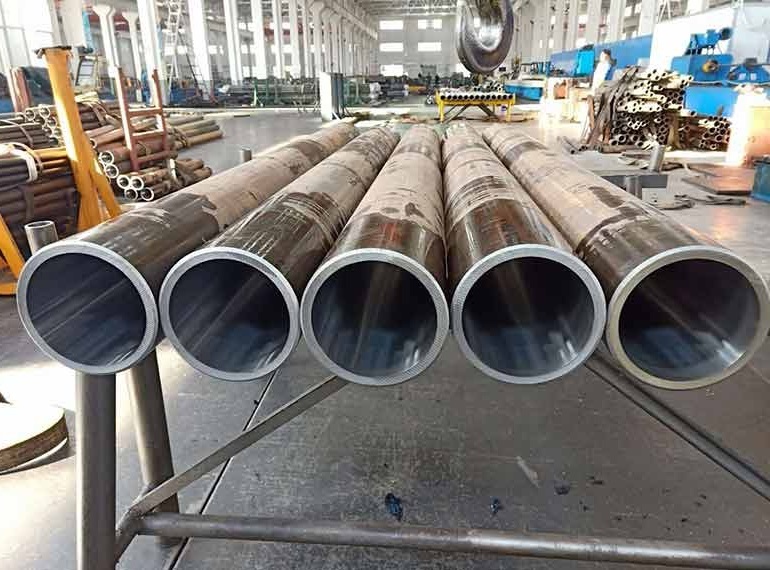The mechanical properties of steel material play a crucial role in the performance and durability of hydraulic cylinder tubes. Among the mechanical properties, yield strength, tensile strength, and elongation are the most critical factors to consider. It is essential to thoroughly evaluate these properties when buying the hydraulic cylinder tubes. In particular, yield strength holds significant importance as it is the primary factor that determines the tube’s ability to withstand pressure and resist permanent deformation. Therefore, when designing a hydraulic cylinder, it is crucial to prioritize the yield strength of the cylinder tube to ensure reliable and safe operation.
The significance of yield strength in hydraulic cylinder tubes
The ability to withstand stress and pressure is a crucial factor in the performance of hydraulic cylinder barrel. Yield strength is a property that plays a significant role in determining whether a material can withstand these conditions without permanent deformation or bending.
In the realm of industrial machinery and equipment, hydraulic cylinder tubes are commonly employed in applications that use high-pressure fluids to produce linear motion. These cylinders are designed to resist substantial force and pressure, and yield strength is a key factor in determining whether a tube can function effectively under these circumstances.
When hydraulic cylinder tubes possess a low yield strength, they are more likely to undergo deformation or bending under the influence of fluid pressure, potentially resulting in power loss, equipment failure, or leakage. In contrast, tubes that exhibit high yield strength are capable of withstanding greater forces and pressures, leading to reliable and safe operation.
For hydraulic systems to function safely and effectively under high-pressure conditions, it is crucial to select hydraulic cylinder tubes that possess high yield strength. This selection ensures the longevity and safety of hydraulic systems.
What is the typical range of yield strengths exhibited by steel grades utilized in hydraulic cylinder tubes?
The yield strength of steel grades utilized in hydraulic cylinder tubes varies based on the application’s specific needs. Some commonly used steel grades for hydraulic cylinder tubes, along with their typical yield strengths, include:
- ST 52.3 / E355 – Yield strength from 517 Mpa – 590Mpa
- SAE 1020 – Yield strength from 410Mpa to 500Mpa
- SAE 1026 – Yield strength ranges from 517Mpa to 590 Mpa
- SAE 4140 / 42CrMo4 – Yield strength ranges from 620 Mpa to 830Mpa
- SAE 1045 – Yield strength ranges from 320Mpa to 655Mpa
It’s important to note that these are typical ranges, and the actual yield strengths may differ depending on the steel’s manufacturing process and heat treatment. Additionally, different standards and specifications may have varying yield strength requirements, making it necessary to consult the appropriate standards and specifications for a given application.
How to enhance the yield strength of the hydraulic cylinder tubes
There are various methods available to increase the yield strength of hydraulic cylinder tube:
-
Grain size refinement: Grain size refinement can be achieved through processes such as recrystallization annealing, which reduces the average grain size of the material, leading to an increase in its yield strength.
-
Shot peening: Shot peening is a cold working process that involves striking the surface of the material with small, hard particles. This process can increase the yield strength of the material by introducing compressive stresses into the surface layer.
-
Surface hardening: Surface hardening techniques such as carburizing and nitriding can increase the yield strength of the material by introducing a hardened surface layer.
-
Alloying: The addition of alloying elements such as tungsten, chromium, and molybdenum can increase the yield strength of steel. These elements form solid solutions with the base metal, which strengthens the material.
-
Microalloying: Microalloying involves the addition of small amounts of elements such as niobium and vanadium to steel. This can increase the yield strength of the material without the need for heat treatment.
By employing these techniques, the yield strength of hydraulic cylinder tubes can be optimized for specific applications. It is recommended to seek advice from qualified material engineers or manufacturers to determine the most appropriate methods for increasing the yield strength of hydraulic cylinder tubes for a particular application.